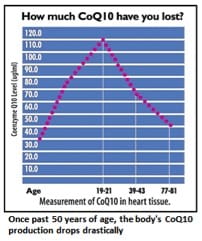– Studies reveal that Coenzyme Q10 pills cut death rates among heart failure patients.

IF you are concerned about your heart health or suffer from constant fatigue, then you will find this article interesting.
You probably already know that Coenzyme Q10 (CoQ10) is produced naturally in your body and plays a critical role in survival.
CoQ10 is the “spark plug” that ignites energy production in virtually every one of your 100 trillion cells. Without it, you will have no energy, which means no life!
Scientific evidence is mounting that CoQ10 may be a useful tool to improve cellular energy levels and fight the ravages of cardiovascular disease.
According to the latest results of a multicentre randomised double-blind trial presented at the Heart Failure Congress 2013 of the European Society of Cardiology Congress in Lisbon, Portugal, CoQ10 supplementation cut death rates of heart failure patients by half.
It is the first pill to improve survival in chronic heart failure since ACE inhibitors and beta blockers were introduced more than a decade ago, and should be added to standard heart failure therapy, says lead author Professor Svend Aage Mortensen (Copenhagen University Hospital, Denmark).
He said: “Other heart failure medications block rather than enhance cellular processes, and may have side-effects.
“Supplementation with CoQ10, which is a natural and safe substance, corrects a deficiency in the body and blocks the vicious metabolic cycle in chronic heart failure called the energy-starved heart.”
Considering this latest finding, those with existing heart conditions might want to seek the advice of their doctor if they have not been prescribed CoQ10 previously.
Many people however, are not aware that CoQ10 exists in two forms in our body. The body makes the regular form (ubiquinone), and then converts it into the active form (ubiquinol), which then renders CoQ10 into a lipid-soluble antioxidant.
But, once past 50 years of age, the body’s CoQ10 production drops drastically. Our ability to convert regular CoQ10 to the active form also diminishes. Both forms of CoQ10 are important, but they have different roles to play in the body.
Besides increasing energy levels, CoQ10’s antioxidant properties protect the body from harmful free radical damage.
When the body’s organs are overwhelmed by free radical attack, we are exposed to chronic degenerative diseases such as heart disease, diabetes, Alzheimer’s, Parkinson disease, etc.
Singaporean researchers found in one study that diabetics have approximately 75% less active form of CoQ10 compared to non-diabetics. This study clearly demonstrates that diabetics used up more of the active form of CoQ10 to combat free radicals.

Statins are cholesterol-lowering drugs that also happen to affect CoQ10 levels by blocking the pathway involved in cholesterol production – the same pathway by which CoQ10 is produced.
This known fact has made Canadian health authorities require that statins sold in Canada carry a precautionary warning regarding CoQ10 depletion.
As your body gets more and more depleted of CoQ10, you may suffer from fatigue, muscle weakness and soreness, and eventually heart failure.
So if you’re taking statin drugs, it’s vital that you take active CoQ10 for preventing serious statin-induced health problems.
The active form of CoQ10 is the predominant form in a healthy body.
Clinical trials have shown that the active form is more easily absorbed than regular CoQ10.
However, most CoQ10 supplements in the market are in the regular form.
Therefore, if your body is already losing its ability to convert regular CoQ10 into the active form due to age, taking these supplements might not increase the amount of active CoQ10 in your body.
Since active CoQ10 is such a powerful antioxidant, it is easily oxidised in the air, and is a challenge to keep stable in a dietary supplement.
This is why, despite knowing about the active form, scientists and researchers could not produce a stable form outside the body. It took them more than a decade to stabilise the active form for use in supplements.
Check your CoQ10 supplement label, and if it states ubiquinone or ubicarenone, you are taking the regular form. If you are unsure, ask your pharmacist.
References:
- S.A. Mortensen, A. Kumar, P. Dolliner, et.al. The effect of Coenzyme Q10 on morbidity and mortality in chronic heart failure. Results from the Q-SYMBIO study. May 25, 2013. Presented at Heart Failure 2013 Final Programme Number 440. The full title of the Q-SYMBIO study is: Coenzyme Q10 as adjunctive treatment of chronic heart failure: a randomised double blind multicentre trial with focus on the changes in symptoms, biomarker status with BNP and long term outcome”.
- Heart Failure 2013
- www.kanekaqh.com
